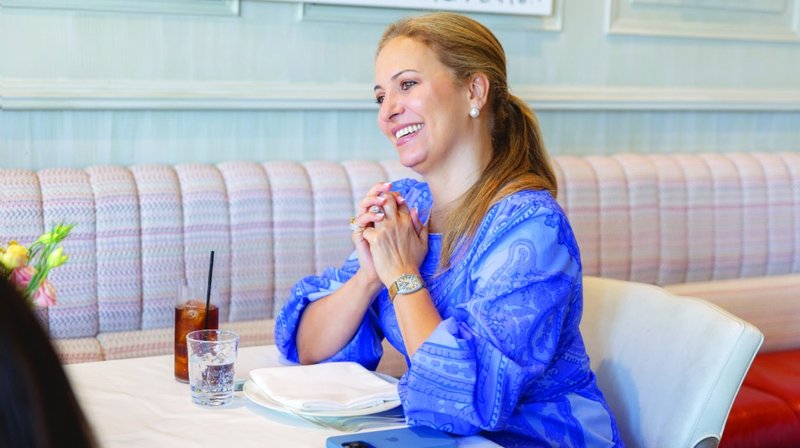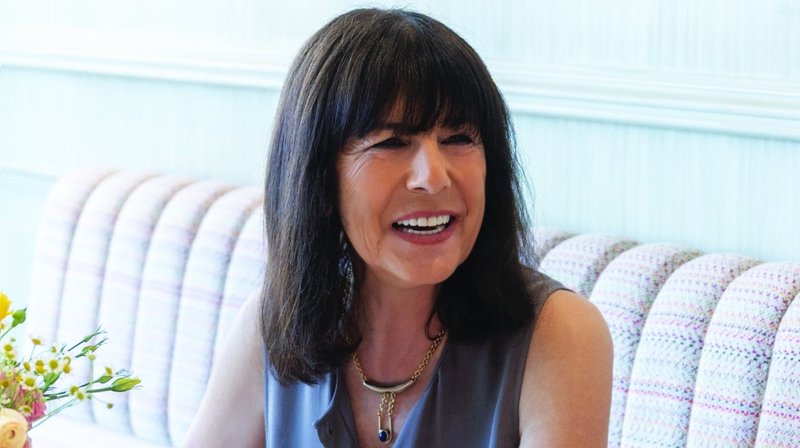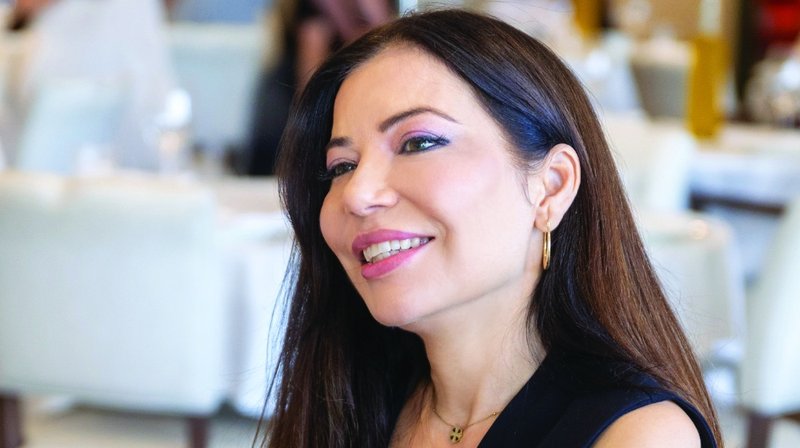Five leading women professionals discuss female leadership and today’s business challenges
07:00 - 24 November 2024

Bringing leading women professionals together is sure to result in a constructive and interesting discussion. And, this is precisely what happened when five such professionals sat down together at La Petite Maison (LPM) Limassol - the French restaurant at Parklane, a Luxury Collection Resort & Spa Limassol.
The topic was close to their hearts: the growing number of female CEOs and self-made women in business, the challenges they face and how women’s leadership style compares to that of men.
Who's who
- Marianna Papachristophorou - Partner, Head of Hospitality Portfolio, Invel Real Estate
- Natasa Pilides - Manager, Conferences & Exhibitions, IMH
- Georgia Constantinou-Panayiotou - Founding and Managing Partner, GCP Law
- Despo Lefkariti - CEO, Delema McCann Cyprus
- Demetra Kalogerou - Financial Consultant, former Chair, CySEC)
The discussion opened with a simple question: Is the upsurge of self-made businesswomen and female CEOs in recent years due to a major cultural change on the part of men or can it be exclusively attributed to women’s persistence?

Marianna Papachristophorou
“I believe both are true,” said Marianna Papachristophorou, who was hosting the brunch gathering. “For decades now, women have been growing more confident and resilient while men have become more accepting of female leadership, voice and opinion.”

Georgia Constantinou-Panayiotou
Georgia Constantinou-Panayiotou believes that dedication to proactive diversity and inclusion programmes have helped increase female leadership representation and retention, improve diversity and address inclusion inequity in all business operations. “CEOs have shown their commitment to leading a female equality improvement agenda and a comprehensive data-supported strategy, with specific attention given to removing bias from all aspects of the employee lifecycle, and individuals have stepped up to take personal responsibility for their advancement,” she explained, adding: “The inspiring stories of women who have broken through the glass ceiling serve as beacons of hope and catalysts for change. These important actions were necessary for more women to take on leadership roles. Change happens when we all take responsibility to accomplish what we want.”

Natasa Pilides
In the view of Natasa Pilides, culture change cannot affect only one section of the population, “So, if there has been a culture change, it has affected both women and men,” she said. “Nevertheless,” she added, “women’s persistence is, I believe, the reason why there has been such a culture change. But it is still nowhere near enough so we must continue to persevere!”

Despo Lefkariti
For Despo Lefkariti, the upsurge of women in business is due to the fact that women have started being more professional and this has led men to accept them. “Women are very capable and they should not stop themselves from being CEOs or taking any other high position in their organisations,” she pointed out.

Demetra Kalogerou
Demetra Kalogerou agreed with Marianna Papachristophorou’s initial statement, noting that, in her view too, “This phenomenon can be attributed to a combination of significant cultural changes and the relentless persistence of women themselves.” Historically, she said, corporate leadership has been a male-dominated arena, often closed off to women due to deep-seated gender biases and societal expectations. “Recent years have witnessed a shift in cultural attitudes, driven by an increased awareness of gender equality and the economic benefits of diverse leadership,” she went on. “Men, particularly in progressive societies, have begun to acknowledge and support the capabilities and contributions of women in the workplace. This change of mindset, coupled with policy reforms such as gender quotas and parental leave, has facilitated a more inclusive environment for women to thrive in leadership roles.”

She recognised, however, that cultural change alone cannot account for the surge in female leadership. “Women’s persistence and determination have played a crucial role, too,” she said. “Women have continuously challenged stereotypes, pursued higher education and developed entrepreneurial ventures, often in the face of significant obstacles. Their determination has not only led to their own success but has also established a model for future generations of female leaders.”
The discussion then turned to the main challenges facing the participants’ specific professions as they examined how Cyprus compares to other countries in this respect. “There have been improvements to the quality of education for women and their access to it, as well as changing social perceptions and technological advancements, that have led to remote work and more flexible work arrangements,” said Kalogerou, before noting the continuing negative aspects. “Significant challenges remain, such as gender pay inequality, limited opportunities for promotion to higher and leadership positions, and the need for better childcare and other dependent care services. As a modern professional in the financial industry, I have observed that, despite the presence of qualified and capable women at low- and middle-management level, their value is often underestimated, hindering their progress to senior positions and leadership; the phenomenon we all know as the ‘glass ceiling’.”

Cyprus currently ranks 21st in the EU on the Gender Equality Index, scoring 9.5 points below the EU average and demonstrating the lowest performance in the area of women’s power and access to decision-making positions. “This indicates that stereotypes about women's roles and status in society, as well as occupational segregation, still act as barriers to women's advancement in the workplace,” said Kalogerou, adding: “These prejudices are often internalised by the women themselves, who consciously or even unconsciously refrain from claiming leadership roles.”
As a former Board member of the Cyprus Bar Association and President of the Young Lawyers Committee, Georgia Constantinou-Panayiotou had the opportunity to design and promote various initiatives on gender equality; “particularly to support vulnerable groups of lawyers such as women lawyers, which now form the vulnerable majority (!) of lawyers in Cyprus”.
A number of surveys conducted among the legal community have uncovered some serious gender equality issue, which, she admitted, are also reported throughout the EU. According to the findings of one such survey, women are overrepresented among the low-paid and minimum salary earners, underrepresented as managers or in higher positions, severely underrepresented in certain areas of the Law (such as criminal law and constitutional law), more easily forced out of the labour market and more susceptible to harassment, mobbing or bullying in the workplace. The survey also found that 51.2% of the young female lawyers responding to questions declared that they had experienced gender discrimination at work. “It is the responsibility of companies and leaders to level the playing field and make sure promotion and pay parity are a large part of their company’s culture,” Constantinou-Panayiotou stressed. “One of our initiatives was a project especially formulated to tackle gender discrimination in the workplace: Action for Equality was a programme addressed to employers, which endorsed best practices for supporting women in the workforce and established an internal mechanism for reporting incidents of discrimination since, according to our survey, 42% had suffered mobbing but 93% of them never reported the incident.”

For Natasa Pilides, the main challenge facing women in all sectors is the inadequate infrastructure for family support and the ongoing expectation that women should undertake the role of main caregiver in every family. “To change this, of course, both the state and the private sector should be creating and funding childcare facilities that remain open until late, as well as promoting other incentives and measures to allocate childcare responsibilities more equally between women and men,” she suggested. “For example, the applicable law could provide the option of shared parental leave (i.e. the freedom to allocate the total, say 4-6 months, between the mother and father) or provide longer obligatory paternity leave for men. If men were also absent from work on paternity leave, a lot of the bias and inequality stemming from motherhood would disappear,” she said.
Marianna Papachristophorou agreed that the main challenge remains combining motherhood with a successful career. “This is why many capable women eventually exit from a position with strong career prospects in favour of a less pressured environment,” she explained. Post-pandemic, the work-from-home model and flexible hours have been adopted by many companies internationally, facilitating a better balance between career and motherhood, she added. “Cyprus compares favourably in this respect, not necessarily because of more favourable employment terms but rather due to the social support system (grandparents) and short distances to be travelled between school, work and home.”

Despo Lefkariti believes that women sometimes also have to deal with uncertainty on the part of their clients, “so, they need to work even harder to prove their worth and the correctness of their views,” she said.
Numerous studies have shown that women often lead more effectively and efficiently than men, having been forced to acquire new skills by balancing leadership at work with their personal lives. So, how does a woman’s leadership style differ from a man’s?
“Women are more empathetic and they want their team to feel like a family. I believe this is the main difference,” said Lefkariti. “Yes, a woman needs to work harder as she has to take care of her family and her job and this is something that I hope will be reduced in the future. In many countries, men now look after the family and leave more space for women to work.”

In Marianna Papachristophorou’s view, women’s relative superiority in skills such as multitasking and EQ (or Emotional Intelligence) differentiates the two leadership styles. “We can certainly not overgeneralise,” she warned. “There are both incredible male and female leaders out there! However, it has been said that a capable female leader is equivalent to 10 men. After thinking long and hard about this, I have concluded that our multitasking nature enables women to have 360-degree vision while high EQ places a focus on human capital in a nurturing fashion, thereby inspiring, motivating and helping staff to grow.”
Natasa Pilides believes that diversity is not such a bad thing. “At the risk of sounding trite, there is beauty in diversity,” she said. “Each one of us is different and our skills, capabilities, strengths and weaknesses are not defined by the mere fact of our being male or female; they are defined by a whole set of factors unique to our personality, our upbringing, our education and life experiences. So, what each person brings to the table is unique and if we are able to harness our strengths in a way that contributes to society, so much the better.” She stressed that she was keen not to “pigeonhole people” and say that women have one set of characteristics and men have another.
“There may be patterns in males and females, just as there are in various other groups, but they by no means define us, our capacity levels or our leadership potential,” she pointed out. “Women are just as capable of leading as men. Not because they have empathy or the ability to multitask or emotional intelligence; they just are.”

Citing studies, Georgia Constantinou-Panayiotou said that women have higher levels of engagement, are more supportive, trustworthy, honest and ethical, and are more communicative and caring leaders. “A 2015 study published by MCSI ESG Research found that companies with three or more women on the Board of Directors deliver a 36% higher return on equity,” she told the gathering. “Recognising the valuable traits of women leaders as more females ascended the ranks, employers trained male colleagues in leadership to adopt these qualities,” she said , before quoting the 2019 Harvard Business Review: “Women are perceived by their managers – particularly their male managers – to be slightly more effective than men at every hierarchical level and in virtually every functional area of the organisation and they are rated better than men on key leadership capabilities”.
Demetra Kalogerou said numerous studies have shown that women often lead more effectively and efficiently than men. “This effectiveness is partly due to the unique challenges that women face, requiring them to develop a distinct set of skills,” she suggested. “Balancing leadership roles with personal lives has forced women to become adept at multitasking and time management. Moreover, the 2020 Global Gender Gap Report emphasised that women leaders often display higher levels of emotional intelligence and crisis management skills. These are critical in today's complex and dynamic work environments for correct decision-making.”
A woman's leadership style often emphasises collaboration, empathy and inclusive decision-making, she went on. “Women leaders are more likely to foster a supportive and team-oriented work environment, encouraging open communication and diverse perspectives. This approach not only enhances employee satisfaction but also drives innovation and productivity. In contrast, traditional male leadership styles have often been characterised by competitiveness and assertiveness. While effective in certain contexts, these traits can sometimes lead to a more hierarchical and less collaborative workplace culture.”

The EU, she added, has been active in promoting gender equality. “One of the significant steps taken in this direction is the Directive requiring listed companies to ensure that at least 30% of their Board members are women by 2026. This regulation aims to increase female representation in top corporate positions, addressing one of the significant barriers to gender equality in the workplace.”
Achieving true equality requires continuous and intensified efforts to address these challenges, according to Kalogerou. This includes enacting policies that promote wage equality, encourage female leadership and provide better support services for working mothers. “Only through coordinated and sustained efforts can we ensure that women in Cyprus have equal opportunities to excel in their professional lives and attain positions of power, thereby actively contributing to the country's economic growth and social progress,” she concluded.
This article was first published in the first edition of MHV Group’s special publication MHV Moments. To view it, click here. To read the entire publication, click here.

